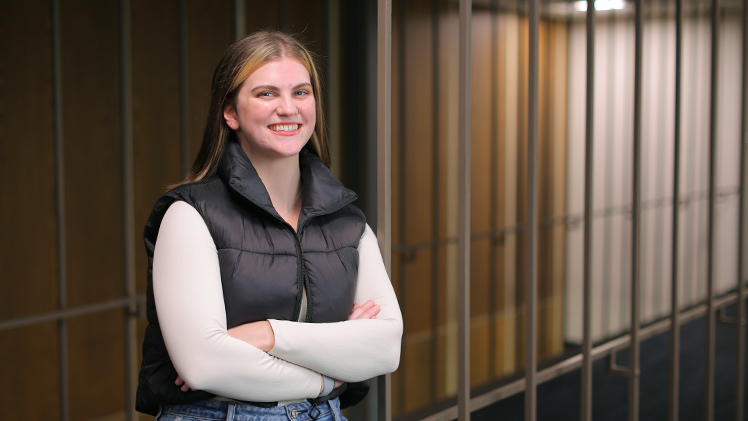Hannah Roegner has fond memories of summers spent on the Great Lakes.
“When I was a kid, my family used to spend time on Lake Michigan and Lake Huron,” said Roegner, who grew up in Royal Oak, Michigan. “I love the Great Lakes.”

Hannah Roegner, a third-year student in the College of Law, is the first Legal Institute of the Great Lakes Fellow.
That affinity is part of what drives her work as the first Legal Institute of the Great Lakes Fellow at The University of Toledo College of Law. Roegner, a third-year student set to graduate in the spring, has spent the first of two semesters as a fellow digging into the ramifications on the country’s waterways from the 2022 U.S. Supreme Court opinion in Sackett v. EPA, in addition to helping to organize and execute the Legal Institute of the Great Lakes’ 24th Great Lakes Water Conference.
The conference brought together approximately 150 lawyers, policymakers, climatologists, journalists and others to discuss the regional implications of climate migration in a live webinar on Friday, Nov. 8.
“Hannah’s interests made her a great fit to be our inaugural fellow,” said Evan Zoldan, a professor in the College of Law and director of the Legal Institute of the Great Lakes. “She has already made significant contributions to the work of the Legal Institute of the Great Lakes, and I look forward to everything that she will accomplish this year.”
The Legal Institute of the Great Lakes has been active within the College of Law since 1993. As a multi-disciplinary research center, it supports research, maintains publications and sponsors annual conferences on legal, economic and social issues of importance to the Great Lakes region of the United States and Canada.
This is the first semester that the institute has supported a fellowship.
“The fellowship is designed to make the institute’s resources available to students who are interested in legal and policy issues of importance of the Great Lakes region,” Zoldan said. “My goal is to help students pursue research that is meaningful to them and important to our University, our community and our entire region. The fellowship is also an opportunity for students to refine their legal and policy analysis skills and broaden their understanding of issues facing the region.”
Fellows are empowered to pursue research that aligns with their individual interests.
Roegner found herself drawn to Sackett v. EPA, a case that began as a dispute over new construction in the Idaho Panhandle and resulted in a precedent-changing interpretation of what do and do not constitute “waters of the United States” under the 1972 Clean Water Act. Namely, this interpretation holds that any wetland that does not connect at its surface to another body of federally protected water does not merit the same degree of protection.
“I was curious about how states have responded to the opinion and what the ultimate impact is going to be on the watersheds surrounding the Great Lakes,” said Roegner, who intends to share her analysis in a blog under the Legal Institute of the Great Lakes. “So, I’ve been sifting through the massive amount of case law surrounding this so far. It’s been really interesting.”
When Roegner arrived at the College of Law in 2022, she brought with her a long-standing interest in criminal justice and clear aspirations toward a career in this field. She holds a bachelor’s and a master’s degree in criminal justice from Adrian College.
She hasn’t shaken that interest as she looks toward her final semester on campus, but she credits classroom and extracurricular experiences with introducing her to the much broader career opportunities that will be open to her with a juris doctor.
Roegner is the secretary of OUTlaw, a student organization geared toward LGBTQ+ students and their allies within the College of Law, and describes as particularly impactful her role with The University of Toledo Law Review, where she’s currently a Note and Comment Editor.
Her interest in the Legal Institute of the Great Lakes Fellowship, too, began as an opportunity to explore an interest in environmental law.
“I’m interested in a lot of different things, but my resume is mostly criminal law,” Roegner said. “This fellowship has been a really great opportunity to not only expand my resume, but also to empower me to take a deep dive into environmental law.”
Fellowships are awarded for the full academic year to a second- or third-year law student who has shown high academic achievement and who demonstrates an interest in the work of the Legal Institute of the Great Lakes. They are supported with a stipend of $1,000.
For more information, including a link to apply, go to the Legal Institute of the Great Lakes Fellowship website.